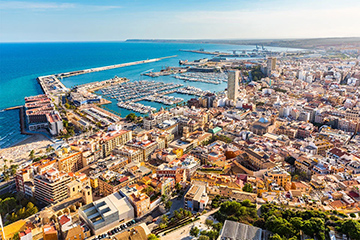- Home
- Blog
- Buying Guide
- Your Complete Guide: How to Get a Mortgage in Spain as a Foreigner
Your Complete Guide: How to Get a Mortgage in Spain as a Foreigner
Spain's real estate market has an alluring appeal to foreigners worldwide, with its rich culture, beautiful landscapes, and promising investment opportunities. If you're a foreigner contemplating buying property in Spain, understanding how to get a mortgage, navigate bank loans, and handle property financing in Spain is critical. This comprehensive guide will offer insights to help you confidently navigate this process.
Online Mortgage Application in Spain
 TEKCE ® has partnered with Spanish banks to offer a new and secure way of applying for online mortgages in Spain. Our partnership provides high-quality, fast, and secure mortgage application services. You may complete the entire mortgage application process in 7 minutes.
TEKCE ® has partnered with Spanish banks to offer a new and secure way of applying for online mortgages in Spain. Our partnership provides high-quality, fast, and secure mortgage application services. You may complete the entire mortgage application process in 7 minutes.
In addition, we collaborate with reliable business partners to provide the best service to our customers. TEKCE ® has joined forces with "Habeno" to offer innovative and secure mortgage solutions for your purchases in Spain. Our collaboration with Habeno allows our customers to benefit from top-notch, swift, and reliable mortgage application services.
Eligibility and Documentation for a Mortgage in Spain
Contrary to some misconceptions, foreigners are eligible for bank loans in Spain. Banks typically lend non-residents between 60-70% of the property's value. To meet the banks' requirements, foreigners usually need to present lower debt-to-income ratios than residents.
To ensure a seamless process when getting a loan in Spain, prepare the necessary documentation in advance. This often includes proof of identity (like a passport), income evidence (recent payslips, tax returns), proof of current residence, a 'Non-Resident Certificate' from the Spanish consulate or embassy in your home country, and a comprehensive list of your current assets and liabilities.
When exploring property financing in Spain, understanding the prevailing mortgage rates is crucial. These rates can differ significantly depending on your chosen bank, the loan-to-value ratio, and your credit history. Spanish mortgages often rely on the Euribor (Euro Interbank Offered Rate) plus a fixed interest margin set by the bank. Non-resident rates generally fall in the 2-3% range, although these figures can change with varying economic conditions.
 While the list of required documents for a mortgage application may seem extensive, they can be easily prepared. The documents typically include:
While the list of required documents for a mortgage application may seem extensive, they can be easily prepared. The documents typically include:
- Copy of the passport
- NIE Number
- Marriage certificate (if applicable)
- Proof of income or employment
- Latest income tax returns
- The property purchase agreement with the seller
- Proof of property tax payments up to date
- Information on existing loans
- Proof of current assets and debts
- Copy of property deeds in Spain and other countries
- Credit rating from the applicant's home country (for non-residents)
It is essential to ensure that all documents are in Spanish or English.
Choosing Your Mortgage Type
Spain offers two main types of mortgages: variable-rate and fixed-rate. Variable-rate mortgages come with an interest rate tied to the Euribor, meaning your payments may increase or decrease. In contrast, fixed-rate mortgages have a steady interest rate throughout the loan, ensuring consistent payment amounts. Specific mortgage options cater to different situations and needs:
 Resident Mortgage: Spanish tax residents can apply for an 80% mortgage based on the property price.
Resident Mortgage: Spanish tax residents can apply for an 80% mortgage based on the property price.Second Home: Those purchasing a holiday home can secure a mortgage of up to 60-70% of the property price.
Off-Plan Future Home: With this mortgage, you can obtain pre-approval at the time of reservation, and the customer profile is updated during the construction phase. This expedites the process, ensuring a smoother property handover. Our business partner Habeno has improved a mortgage application system, specially tailored for off-plan properties. This new-generation mortgage application system by Habeno allows our customers to get pre-approval, giving them peace of mind for the next steps of their purchasing journey. It encourages them to proceed with their property purchase with confidence with the mortgage already approved.
Buy Land and Build Your Home: This type of mortgage requires more detailed work and offers tailored services to suit your specific requirements.
Multiple Property Purchase: If you already own a property in Spain or Portugal, you can acquire a 50% mortgage for investment purposes.
Property above 1 Million Euro: By depositing secured funds in private banking, you can obtain a mortgage of up to 100%. This option involves assessing risk profiles and detailed private banking work.
Equity Release on Spanish Property: If you already own a property in Spain and plan to purchase a new one, you can obtain up to a 90% mortgage by offering a double guarantee. This allows you to buy a new property without waiting for your existing property to sell.
In addition to the mortgage amount, it's important to consider additional costs when purchasing a property in Spain, which can amount to approximately 10-12% of the property value. Therefore, it is advisable to have a minimum of 40% of the property value available before applying for a mortgage.
Property Valuation: A Vital Step
 Before you secure a mortgage in Spain, the lender will order an official property valuation. This appraisal is crucial for ensuring that the asking price aligns with the property's actual market value, thus safeguarding your investment.
Before you secure a mortgage in Spain, the lender will order an official property valuation. This appraisal is crucial for ensuring that the asking price aligns with the property's actual market value, thus safeguarding your investment.
Why You Need Legal Advice and Translation Services
Given the intricacies involved in property financing, it's beneficial to enlist the services of a local lawyer who is fluent in Spanish and your native language. They can help review contracts, ensure your interests are protected, and simplify the translation of complex terms and processes.
Factoring in Additional Costs
When considering how to get a mortgage in Spain, be mindful of the extra costs involved, beyond the property price. These might include property tax, legal fees, notary fees, registration and administration fees, mortgage arrangement fees, and property valuation fees. Factoring in these costs early can save you from future financial surprises.
FAQ
What is the mortgage rate in Spain for foreigners? What is the deposit required for a Spanish mortgage?When buying property in Spain, non-resident buyers can usually get a mortgage of 60-70% of the property value. This means a 30-40% down payment is required. The down payment only covers the remaining portion of the property price. Notary fees, title deed costs, taxes, and other purchase expenses cannot be financed and must be paid in cash. These additional costs are not included in the mortgage.
If the bank finds the financial documents insufficient or considers the property a holiday or personal home rather than an investment, the mortgage rate may be reduced to 50%. Mortgage terms in Spain may change depending on economic conditions, so professional guidance is recommended.
Does not being an EU citizen affect the mortgage approval process in Spain?Not being an EU citizen usually does not hurt your chances of getting a mortgage in Spain. Spanish banks can check the financial information of EU citizens faster. However, they may ask for more documents from non-EU citizens.
The most important factors for mortgage approval are the documents you submit and your financial strength. Your income level, regular earnings, bank statements, and ability to repay the loan matter more than your citizenship.
Banks may also consider the economic situation of your home country and its risk level. Sometimes, being an EU citizen is not enough on its own. Each application is looked at based on the applicant's financial profile. With proper document preparation and professional support, non-EU citizens can also obtain a mortgage in Spain.
What do you need for a mortgage in Spain as a foreigner?To get a mortgage in Spain as a foreigner, you must first have a NIE number. Spanish banks check your regular income, credit history, and financial situation.
You usually need to pay a down payment of 30-40% of the property's value. Banks also ask for full documentation, including bank statements, tax returns, proof of income, and valid ID.
Your credit score in your home country is important, as banks review past debt and payment history when approving a mortgage.
How long is the term of a mortgage in Spain?Mortgage terms in Spain usually range from 10 to 30 years. The mortgage term in Spain affects both monthly payments and total interest costs. Longer loan terms lower monthly payments but increase the total interest paid.
Spanish banks decide the mortgage term based on the applicant’s income, age, financial history, and repayment capacity. This means buyers can access different Spain mortgage term options that fit their budget and payment plan.
Age limits also affect Spanish mortgage terms. Some banks set the maximum loan end age at 70, while others allow up to 75. This may reduce the maximum loan duration for older applicants.
Overall, mortgage terms in Spain are flexible and tailored to the buyer’s financial profile.
Is home insurance mandatory with a mortgage in Spain?Yes. Home insurance is mandatory when buying a house in Spain with a mortgage. Spanish banks require buyers to have property insurance to protect both the home and the mortgage loan. This insurance usually covers fire, earthquake, and structural damage.
The home insurance policy must stay active for the entire mortgage period. While banks often suggest their own insurance providers, buyers are free to choose another insurance company as long as the coverage meets the bank’s requirements.
Mandatory home insurance is a standard condition for mortgage approval in Spain and is required before the loan is finalized.
Can rental income from a property in Spain be used as income for mortgage repayments?Spanish banks only consider existing and verifiable income when reviewing a mortgage application in Spain. If the applicant already earns rental income, banks usually accept long-term rental income supported by an official lease contract as proof of income.
However, short-term or holiday rental income is generally not accepted because it is considered unstable and uncertain. Likewise, future rental income from a property that has not yet been purchased is not taken into account during the mortgage approval process.
In summary, when applying for a mortgage in Spain, banks focus on current, regular, and contract-based income. Expected or potential rental income is not considered for mortgage eligibility.
Can I get a mortgage in Spain remotely with a power of attorney?Yes. In Spain, a mortgage can be arranged remotely using a power of attorney. A notarized power of attorney allows your legal representative to apply for a Spanish mortgage, sign loan documents, and handle all bank transactions on your behalf.
The authorized representative can manage the property purchase, title deed transfer, notary signing, and mortgage process without the buyer traveling to Spain. If required, they can also settle existing bank debt linked to the property.
To ensure a smooth and secure process when buying property remotely in Spain, it is strongly recommended to work with a lawyer experienced in Spanish real estate and mortgage procedures, who can prepare the power of attorney correctly and oversee the entire transaction.




.jpg)
 Resident Mortgage: Spanish tax residents can apply for an 80% mortgage based on the property price.
Resident Mortgage: Spanish tax residents can apply for an 80% mortgage based on the property price.